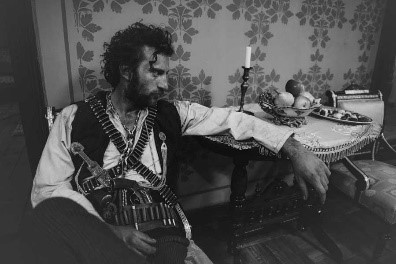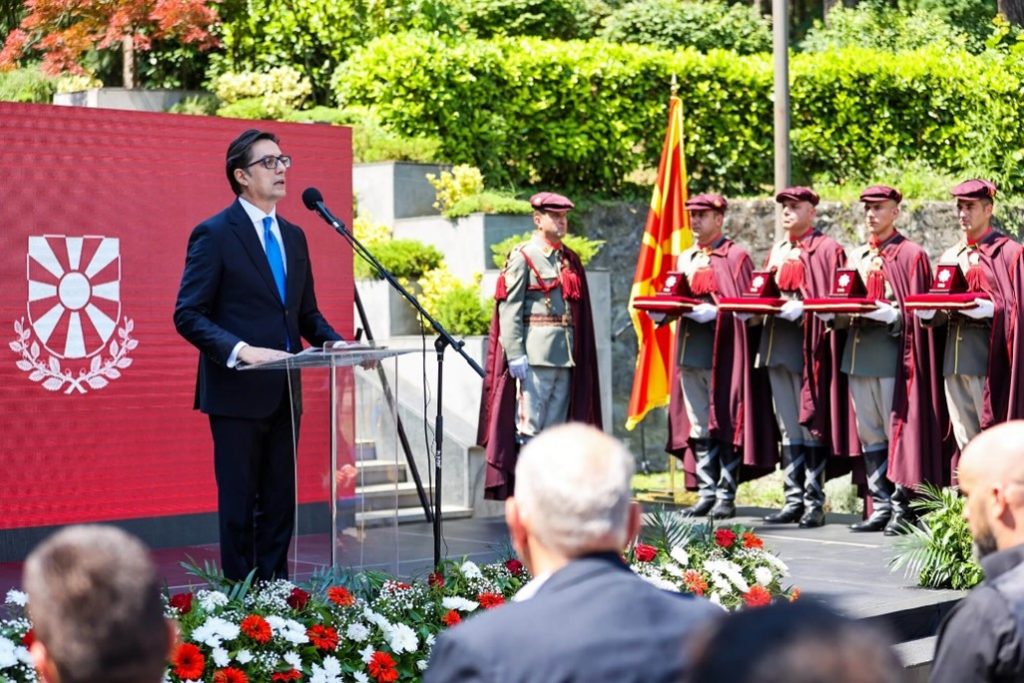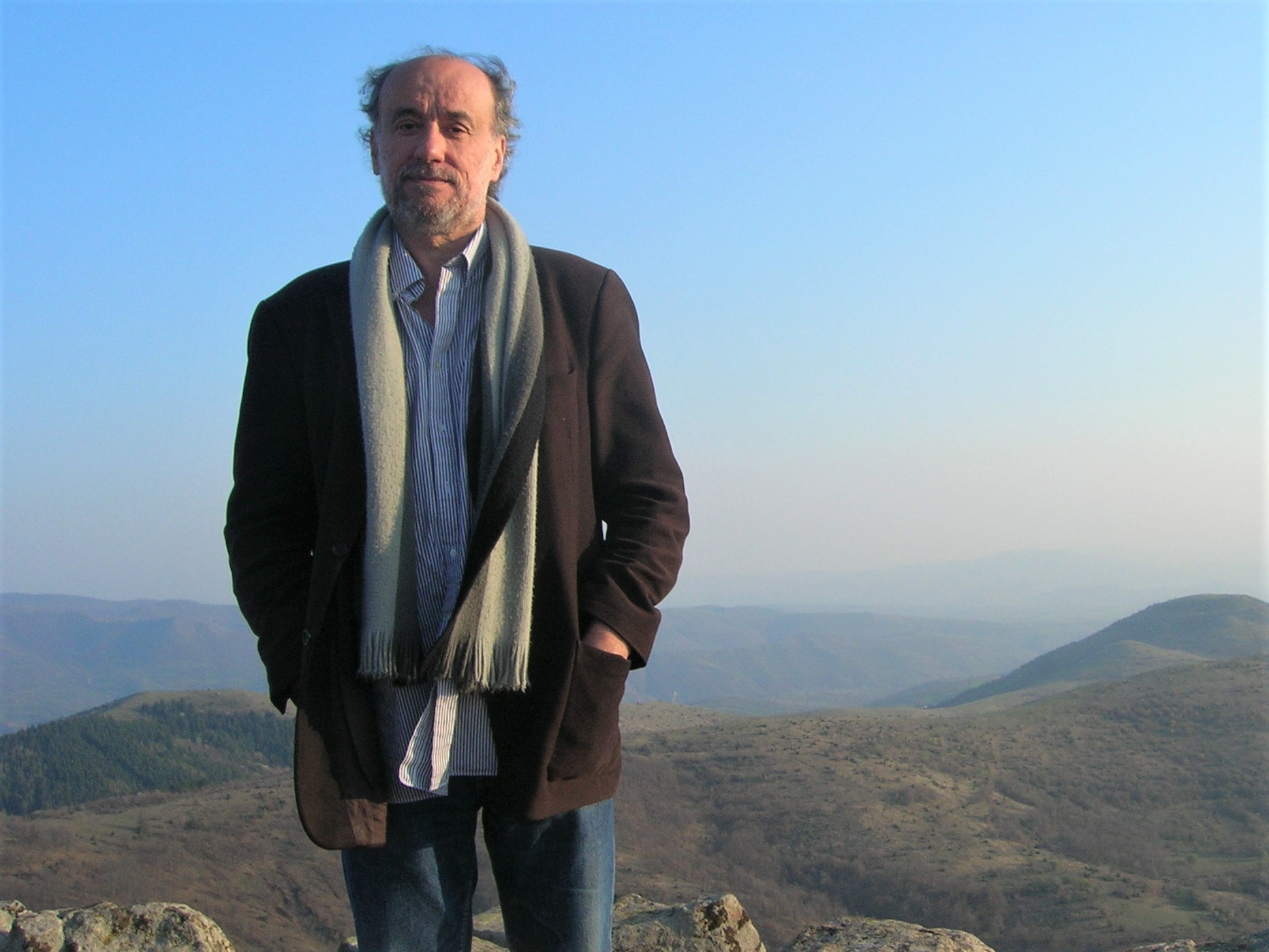приказните се сржта на нашиот живот, ` рбетот на нашиот идентитет.
Goran Stefanovski1
[Translation] All living creatures are born with a survival instinct. In order to survive, spiders spin webs. In order to survive, we spin stories. For us there is nothing more important than these stories. They are the essence of our lives, the backbone of our identity.
Goran Stefanovski was an internationally renowned playwright, screenwriter and academic. For sixteen years, he was a Senior Lecturer in the School of Creative Arts and Industries at Canterbury Christ Church University, before his death in November 2018.2
A significant creative artist, public intellectual and inspiring educator, Goran received the 2007 Golden Award for Lifetime Achievement in Playwriting from the Sterijino Pozorje International Theatre Festival, and the 2007 Vilenica Literary Prize, awarded by an international jury to an author from Central Europe for outstanding achievement in the field of literary creativity and essay writing, in addition to many other literary and theatrical awards and prizes during his long career.3 In 2018 he was declared an honorary Doctor of Science by the National Academy of Theater and Film Arts in Sofia, Bulgaria, just one month before his untimely death at the age of 66.4
Biography
My name is Goran Stefanovski. This is the story of my life in a few short sentences. I was born in the Republic of Macedonia, which, at that time, was part of the Federative Republic of Yugoslavia. My father was a theatre director, and my mother was an actress. I spent my first 40 years in Skopje as a playwright and a teacher of drama. I married Pat, who’s English. We had two children, and we were happy. We had a good story.5
‘Goran was born on 27 April 1952 in Bitola, a town then in Yugoslavia, near the border with Greece on the Balkan Peninsula in Eastern Europe. His father, Mirko, was a theatre director and his mother, Nada, a leading actress. Much of Goran’s childhood was spent in theatres. His younger brother is Vlatko Stefanovski (Влатко Стефановски), a well-known virtuoso guitarist.’6
As an undergraduate in the 1970s, Goran studied English language and literature at the University of Skopje, then playwriting, screenwriting, history of drama and theatre directing in Belgrade, where he went on to receive his MA in Literature Studies.7 In October 1974 he met Pat Marsh, an English linguist who came to teach English at Skopje University. They married on March 14, 1976.8
In his long and varied academic career, from 1978-1995 Goran was a lecturer in English Literature then Head of Playwriting at the University of Skopje, a Fulbright Outstanding Artist Scholar at Brown University, then Vice-Dean of the Faculty of Dramatic Arts and full Professor at Skopje. From 1995-2000, he was a Visiting Professor at the Dramatic Institute, Stockholm.9
With the 1991 civil war in Yugoslavia escalating, the family moved to Canterbury, England in September 1992. ‘For the next six years, Stefanovski was to commute between his homeland and the UK, continuing his teaching in Skopje.10 In 2002 Goran became a lecturer in playwriting at the University of Kent, and from 2002-2018, Senior Lecturer in Scriptwriting at Canterbury Christ Church University.11 He is recalled here in September 2023 by Charlie Tidmas, a former student of Goran’s at the university, who now lectures on the latest iteration of the screenwriting module that Goran once taught:
Goran’s love of storytelling was infectious and his generosity towards his students immeasurable. If even the tiniest spark of interest in storytelling lit up inside you, if you developed the most fractional fascination in the mysteries and mechanics of stories, he would go above and beyond to fan that spark into a flame. As a lecturer, Goran used sprawling hypotheticals and challenging “what ifs” to stimulate the imaginations of his students and open up worlds of possibilities to them. Some of his famous conceits are recalled to this day by anyone lucky enough to have taken his classes, such as the storytelling potential of an egg, or cutlery, or indeed anything found in a kitchen. Goran cared deeply about the individual interests and potential of each student that he worked with. His students think of him with nothing but fondness for the man who recommended, in a pinch, that they try having a character walk into a scene with a loaded gun, because “what if”?12
Goran’s extensive catalogue of scholarly works, including listings of conference presentations, guest lectures (some filmed and available on YouTube), and a chronology of his academic essays and articles are available here.13
Dramatic works
Goran was a prolific creative writer across theatre, radio, television and film. Full listings of his many creative works, productions, and publications are available here.14 His drama frequently dealt with issues of migration, post-communist transition and identity, as well as what it means to be human.15 Some of his key works include:
Wild Flesh / Диво месо (1979)
Wild Flesh has become Goran’s best-known play. A work that has ‘had fifteen productions to date all over Europe, including London, and is on the secondary school curriculum in his homeland. The play is based on the experiences of his father and uncles during World War II. It brought him the October Prize of the Republic of Macedonia for exceptional artistic achievement, the highest award of the Republic, as well as the 1980 Award for Best Yugoslav Play of the Year at the Sterijino Pozorje Theatre Festival and was performed at the Belgrade International Theatre Festival.’16
The False Bottom / Дупло дно (1983) and in The Black Hole (Црна дупка) (1988)
In the 1980s Goran continually pushed the boundaries of Yugoslav theatre, both in an artistic and political sense. The False Bottom was particularly bold in its challenge to state censors, whilst The Black Hole, with its unique structure and stunning theatricality, it was considered to be an important contribution to European theatre.17
The Crazy Alphabet / Бушава азбука (1985)
‘1985 marked a departure for the dramatist into a TV serial for children, The Crazy Alphabet (Бушава азбука), each episode teaching one of the 31 letters of the Macedonian alphabet through a combination of animation and sketches.’18 It proved immensely popular, being re-shown during Covid-19 lockdown school closures in Macedonia to help children’s learning.19
To the Hilt / До балчак (2014)



Figures 2-4: https://stolepopov.com/production/to-the-hilt/
In 1987, Stefanovski wrote the first version of a screenplay for film director, Stolé Popov (Столе Попов), dealing with the aftermath of the catastrophic 1903 Ilinden Uprising against Ottoman rule. To the Hilt was not made until 2014, but it was the first of six screenplays Stefanovski was to write and began his involvement with film.20
A Little Book of Traps (A scriptwriting tool) (2002)
Traps has been translated into five languages, its themes the subject of a filmed presentation that Goran undertook at Canterbury Christ Church University available to view here; also available to read and download as an academic paper from our research repository here.21
Remembrance
In 2019, the SPACER arts organisation and the Stefanovski family jointly commissioned a bronze sculpture to commemorate Goran (more details and photos.) The finished piece is situated on Goran’s memorial bench in the Debar Maalo Park, Skopje.22
In July 2021, Goran posthumously received the Order of Merit for the Republic of North Macedonia from President Stevo Pendarovski, for his exceptional and unique contribution to the continuity and modernization of the literary cultural heritage, for the foundation, development and promotion of contemporary cultural and artistic values in the country and internationally, for the development of Macedonian drama and for establishing the foundations of new dramaturgical forms in the Macedonian literature, for enriching and nurturing the Macedonian language and for establishing new models in the educational and pedagogical sphere.23 Further details and additional photos.)

In November 2022, an event was held on the 70th anniversary of Goran’s birth at the Department of Slavic Studies of the University of Ljubljana, where students from the Faculty of Philosophy joined in addition to Slovenian students at the University of Zagreb and from the Faculty of Philology “Blaje Koneski” at the University “St. Cyril and Methodius” in Skopje to celebrate and discuss Goran’s work.24 (Further details.)
In December 2022, a group including Canterbury Christ Church University Pro Vice-Chancellor and Dean of the Faculty of Arts, Humanities and Education, Lynnette Turner, university colleagues, and the Charge D’Affaires of the North Macedonian Embassy in London, came together with Goran’s widow Pat Marsh to dedicate a bench in Goran’s memory, along with a plaque constructed by the University featuring some of Goran’s writing and a Mediterranean garden space outside the Powell Building.25
In December 2022 to January 2023, an event was held in Debar Maalo Park, Skopje to commemorate Goran’s work.26 (Additional information and photos.)
The Goran Stefanovski Foundation protects and promotes Goran’s work internationally, as well as sponsoring aspiring young writers for theatre, film and arts events.27
Authored by Irene Szmelter and Nick Berbiers
Library and Information Advisors
September 2023
Selected further reading and viewing:
‘Tales from the Wild East’, piece for Eurozine by Goran Stefanovski, 2009
Sir Tom Stoppard in Conversation with Goran Stefanovski, 2015
Interview with Goran on ‘Tintin in the Balkans’, 2015
- https://euhouse.mk/mk/tribute-to-goran-stefanovski/ [original source unspecified]. ↩︎
- https://en.wikipedia.org/wiki/Goran_Stefanovski. ↩︎
- https://goranstefanovski.co.uk/curriculum-vitae/. ↩︎
- https://goranstefanovski.co.uk/. ↩︎
- https://www.eurozine.com/tales-from-the-wild-east/. ↩︎
- https://en.wikipedia.org/wiki/Goran_Stefanovski. ↩︎
- https://goranstefanovski.co.uk/curriculum-vitae/. ↩︎
- https://en.wikipedia.org/wiki/Goran_Stefanovski ↩︎
- Ibid ↩︎
- Ibid ↩︎
- https://goranstefanovski.co.uk/curriculum-vitae/. ↩︎
- Charlie Tidmas, email contact with Nick Berbiers, 03.09.23. ↩︎
- https://goranstefanovski.co.uk/. ↩︎
- Ibid ↩︎
- https://en.wikipedia.org/wiki/Goran_Stefanovski. ↩︎
- Ibid ↩︎
- Ibid ↩︎
- Ibid ↩︎
- https://www.slobodenpecat.mk/en/mrtv-od-utre-ja-vraka-bushava-azbuka-na-programata/. ↩︎
- https://en.wikipedia.org/wiki/Goran_Stefanovski. ↩︎
- https://www.canterbury.ac.uk/arts-and-humanities/cpbra/conferences/a-virtuous-circle/goran-stefanovski.aspx; https://repository.canterbury.ac.uk/download/0510bf29c54a7dca756d286d2da3153d588008f87d203b2829eced926113d02f/125774/13670.pdf. ↩︎
- https://www.euhouse.mk/mk/newsletter/europe-house-buzz-december/. ↩︎
- https://pretsedatel.mk/en/orden23072021-3/. ↩︎
- https://www.slobodenpecat.mk/en/eseistikata-na-goran-stefanovski-gi-obedini-makedonistite-i-juzhnoslavistite-od-ljubljana-zagreb-i-skopje/. ↩︎
- https://cccualumni.com/colleagues-gather-at-dedication-ceremony-for-goran-stefanovski/. ↩︎
- https://www.euhouse.mk/mk/newsletter/europe-house-buzz-december/. ↩︎
- https://en.wikipedia.org/wiki/Goran_Stefanovski; https://www.facebook.com/groups/704341336843577. ↩︎
 Library
Library Steve Peters
Steve Peters 418
418







